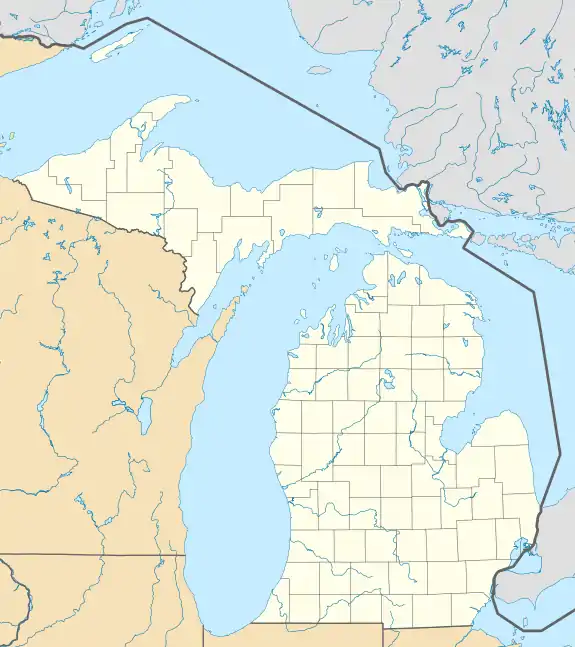Holcombe Site | |
 The historic marker is placed "near" the Holcombe Site | |
  | |
| Location | Intersection of Metropolitan Parkway and Dodge Park Road, Sterling Heights, Michigan[1] |
|---|---|
| Coordinates | 42°34′7″N 83°0′34″W / 42.56861°N 83.00944°W |
| Area | 1 acre (0.40 ha) |
| NRHP reference No. | 71001023[2] |
| Significant dates | |
| Added to NRHP | April 16, 1971 |
| Designated MSHS | July 17, 1970[3] |
The Holcombe Site, also known as Holcombe Beach,[3] is a Paleo-Indian archaeological site located near the intersection of Metropolitan Parkway and Dodge Park Road[1][3] in Sterling Heights, Michigan, United States. It was listed on the National Register of Historic Places in 1971[2] and designated a Michigan State Historic Site in 1970.[3]
Site discovery
In 1961, amateur archaeologists Jerome DeVisscher and Edward J. Wahla[4] discovered evidence of an ancient settlement at this site.[3] Later radiocarbon dating of hearth elements determined the site to be an 11,000-year-old Paleo-Indian settlement.[3][5] A five-year dig by archaeologists from the University of Michigan uncovered numerous artifacts.[4] The distinctive small, thin, fluted arrowheads found at the site were dubbed "Holcombe points;" similar flint arrowheads have been found at other sites in Michigan and southern Ontario, with scatterings in northern Ohio, Indiana, Wisconsin, and Minnesota.[5]
Historical description of the site
The Holcombe site was situated on what was, at the time it was occupied, the strandline of a small glacial lake that probably drained into nearby Lake Algonquin.[6] Arrowheads, flint chips, and bone fragments were recovered, indicating that these Paleo-Indians hunted Barren-ground Caribou, a species particularly adapted to the tundra-like conditions that existed at the time. The site yielded evidence of the Indigenous people's change in culture and subsistence as the climate in the area changed.[3]
References
- 1 2 The NRHP lists the location of this site as "address restricted." The Michigan State Housing Development Authority gives the location as noted, and has erected a marker at the site. The marker text states the actual location is "near this site." Geocoordinates reflect the location of the marker.
- 1 2 "National Register Information System". National Register of Historic Places. National Park Service. March 13, 2009.
- 1 2 3 4 5 6 7 "Holcombe Site (20MB30)". Michigan State Housing Development Authority: Historic Sites Online. Archived from the original on June 1, 2012. Retrieved June 16, 2011.
- 1 2 "Prehistoric History". City of Serling Heights. Archived from the original on December 27, 2012. Retrieved June 17, 2011.
- 1 2 Dan Higginbottom; Guy Gibbon (March 2009). "Holcombe". University of Minnesota Department of Anthropology. Retrieved June 15, 2011.
- ↑ Peter L. Storck; Royal Ontario Museum (2004), Journey to the Ice Age: discovering an ancient world, UBC Press, p. 219, ISBN 0-7748-1028-9
Further reading
- James Edward Fitting; Jerry De Visscher; Edward J. Wahla (1966), Jerry De Visscher; Edward J. Wahla (eds.), The Paleo-Indian occupation of the Holcombe beach, University of Michigan

